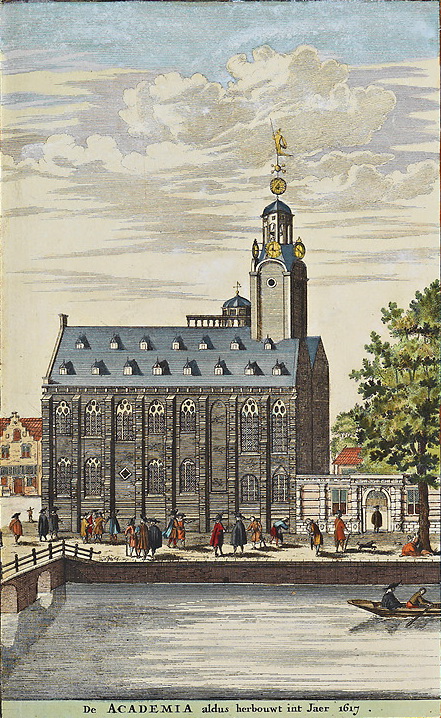
(image: Grotius; source: Wikimedia Commons)
Leiden University, the Grotius Centre for International Legal Studies has a vacancy for an
Assistant Professor in Public International Law
Key responsibilities
- Develop and deliver core courses in the Bachelor and Regular LLM programmes in public international law in English and Dutch;
- Coordinate and lead teaching activities in cooperation with other lecturers;
- Conduct high-level research in public international law and sustain a strong publication record;
- Develop and lead core activities of the Centre and to seek, obtain and manage research funding or other funding;
- Assist in a collegial way in any other research or teaching-related work of the Centre;
- Offer specialized seminars and grade assignments and exams, alone or in cooperation with other lecturers.
Selection criteria
- Excellent command of Dutch and English;
- PhD-degree and excellent track record in research in general public international law, as evidenced by publications in leading international journals;
- Demonstrated teaching experience in public international law, supported by positive teaching evaluations;
- A high sense of initiative, leadership qualities and proven ability to seek and obtain research funding;
- Strong dedication and commitment to the goals and objectives of the Centre;
- An ability and willingness to work collaboratively and collegially in a team.
Our organisation
With over 5,000 students and 450 members of staff, Leiden Law School is one of the largest faculties in the Netherlands. Yet, in all its diversity, it is still known for its ability to provide education on a small scale. The Faculty focuses on multi-faceted high-level teaching and research, both nationally and internationally. It does so by working with talented people and stimulating and supporting them in their professional and personal ambitions. The Faculty is housed in the beautifully restored Kamerlingh Onnes Building on the Steenschuur in Leiden. Working for the Leiden Law School means working in an inspiring scientific environment. For more information, see our website.
Terms and conditions
We offer an one year term position, with the possibility of renewal based on need, funding and performance. Salary range from € 3,637.- to € 4,978.- gross per month on a full-time basis (pay scale 11, in accordance with the Collective Labour Agreement for Dutch Universities). The principal place of work is Leiden. The intended starting date is 1 September 2020.
With over 5,000 students and 450 members of staff, Leiden Law School is one of the largest faculties in the Netherlands. Yet, in all its diversity, it is still known for its ability to provide education on a small scale. The Faculty focuses on multi-faceted high-level teaching and research, both nationally and internationally. It does so by working with talented people and stimulating and supporting them in their professional and personal ambitions. The Faculty is housed in the beautifully restored Kamerlingh Onnes Building on the Steenschuur in Leiden. Working for the Leiden Law School means working in an inspiring scientific environment. For more information, see our website.
Terms and conditions
We offer an one year term position, with the possibility of renewal based on need, funding and performance. Salary range from € 3,637.- to € 4,978.- gross per month on a full-time basis (pay scale 11, in accordance with the Collective Labour Agreement for Dutch Universities). The principal place of work is Leiden. The intended starting date is 1 September 2020.
Leiden University offers an attractive benefits package with additional holiday (8%) and end-of-year bonuses (8.3 %), training and career development and sabbatical leave. Our individual choices model gives you some freedom to assemble your own set of terms and conditions. For international spouses we have set up a dual career programme. Candidates from outside the Netherlands may be eligible for a substantial tax break. More information can be found here
UTQ
Leiden University requires teaching staff to obtain the University Teaching Qualification. If the successful applicant does not already possess this qualification or its equivalent, he/ she must be willing to obtain this Qualification within two years.
Diversity
Leiden University is strongly committed to diversity within its community and especially welcomes applications from members of underrepresented groups.
Information
Enquiries can be made to Nathalie Walstra, email n.walstra@law.leidenuniv.nl.
Leiden University requires teaching staff to obtain the University Teaching Qualification. If the successful applicant does not already possess this qualification or its equivalent, he/ she must be willing to obtain this Qualification within two years.
Diversity
Leiden University is strongly committed to diversity within its community and especially welcomes applications from members of underrepresented groups.
Information
Enquiries can be made to Nathalie Walstra, email n.walstra@law.leidenuniv.nl.
Applications
Please submit online your application no later than 15 June 2020 via the blue button in our application system. Applicants should submit online a letter of interest accompanied by a CV.
(source: University of Leiden)
Please submit online your application no later than 15 June 2020 via the blue button in our application system. Applicants should submit online a letter of interest accompanied by a CV.
(source: University of Leiden)













